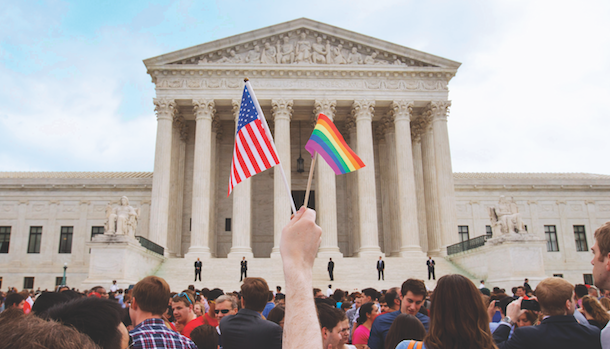Stage Collapse Shines Light on Indiana Stance on Gays
By CHARLES WILSON
INDIANAPOLIS – Legal claims filed by the partners of two lesbian women killed in a stage collapse at the Indiana State Fair last month could lead Indiana to examine how it defines survivors in wrongful death cases despite the state’s unwillingness to recognize same-sex unions.
Christina Santiago, 29, of Chicago and Tammy VanDam, 42, of Wanatah, Ind., were among seven people who died after a strong gust of wind toppled the stage rigging before an Aug. 13 concert by country band Sugarland. Santiago’s partner, Alisha Brennon, and VanDam’s partner, Beth Urschel, were injured.
A wrongful death lawsuit has been filed on behalf of Urschel, and a wrongful death tort claim- a precursor to a possible suit- has been filed with the state of Indiana on behalf of Brennon.
Indiana’s wrongful death statute allows next of kin to collect damages. But those are technically people related by DNA, adoption or marriage, said Jennifer A. Drobac, a professor at the Indiana University School of Law in Indianapolis.
VanDam and Urschel had registered several years ago in Hawaii as reciprocal beneficiaries, a status that confers some of the legal benefits of marriage- including survivor benefits- to unmarried couples. Friends and colleagues said Brennon and Santiago had gone through a civil union in Illinois and planned to marry.
Indiana doesn’t recognize those acts. But the courts could choose to define next of kin more broadly to include people who live together, share bank accounts, have children together or are otherwise committed to sharing their lives, Drobac said.
“If you behave like a family, then we’ll call you a family,” she said.
Andrew Koppelman, a professor of law at Northwestern University who has written a book on how the law treats same-sex couples, said the only decided wrongful death case involving same-sex survivor benefits he was aware of was one involving a New York couple who had gone through a civil union in Vermont. In that case, a trial judge initially sided with the surviving partner, John Langan. Appellate courts later reversed that ruling, though two dissenters wrote that denying Langan the right to sue the hospital where his partner died might violate the equal protection clause of the U.S. Constitution.
Koppelman, author of “Same Sex, Different States,” said he suspected the couples involved in the stage collapse would face similar challenges.
“My guess is that they have a problem because they won’t count as spouses under the wrongful death statute,” he said in an e-mail.
Camilla Taylor, an attorney with the gay rights group Lambda Legal, cited a 2001 California case in which a surviving lesbian partner was allowed to proceed with a wrongful death suit even though same-sex couples weren’t allowed to marry.
The situation is complicated by the hodgepodge of state laws governing same-sex relationships, making them legal in some states and banned in others. Five states- Rhode Island, Illinois, New Jersey, Hawaii and Delaware- have civil union laws that give gay couples the same legal rights and benefits as traditional marriage. Six states now allow gay couples to marry: Iowa, Massachusetts, New Hampshire, Connecticut, Vermont and New York.
“I kind of wonder how heterosexual couples would feel if they crossed a state border and they were legal strangers,” Drobac said.
Attorney Kenneth J. Allen of Valparaiso, who has filed a lawsuit in VanDam’s death, said Indiana needs to establish survivorship rights for gay couples.
“It’s an uphill battle, but it’s a battle that needs to be fought,” Allen said, noting that Urschel, 49, has undergone surgery and has had to use a wheelchair since the accident
The Indiana General Assembly this year approved a constitutional amendment that would ban same-sex marriage. Both the House and Senate must approve the same resolution again for the proposed amendment to get on the statewide ballot in November 2014, where it would have to be approved by voters before taking effect.
Democrats who formerly controlled the House had managed to block the amendment for years, arguing it was redundant because state law already expressly prohibits same-sex marriage and states that such marriages performed elsewhere aren’t valid in Indiana. The amendment’s supporters argue that isn’t enough, because judges might strike down that law.
Friends and colleagues say Santiago and Brennon were like a family. Santiago, who managed programming for the Lesbian Community Care Project at Howard Brown Health Center in Chicago, was active in the lesbian and Latino communities. Wherever she went, Brennon was by her side, friends say.
“They were a powerhouse together,” said Jamal M. Edwards, president and CEO of the health center. “When you saw them out you could see they were very much in love.”
“They were partners in every sense of the word,” he added.
Taylor said the Indiana cases could make a difference- in attitudes, if not legally- even if the surviving partners don’t receive damages stemming from their loved ones’ deaths.
She said telling the story of their “has the potential to change hearts and minds.”
“The pain they feel is the same, and the law should reflect that,” Taylor said.
Drobac said traditional couples in Indiana can collect damages based on loss of companionship, loss of earnings and even the emotional trauma of watching a loved one die. Lawyers for the stage collapse victims could argue that the surviving partners experienced the same losses as the families of the other five victims, she said.
“Does it really matter if the partner is male or female? Isn’t that loss going to be felt just as grievously?” she asked.
Even if the courts determine the same-sex partners are entitled to wrongful death benefits, the awards will be limited. Indiana’s liability is $5 million for the incident.










